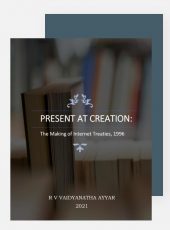
Some time ago, we had brought to you a list of freely accessible scholarly material on and around Intellectual Property – the post is here and the list is here – and are happy to say that we are in the process of updating that list with even more books and materials! There is however one stand-out entry that looks like it will be of interest to several of our readers. Published in late 2021, Dr R.V.Vaidyanatha Ayyar’s 421 paged “Present at Creation: The Making of Internet Treaties 1996” is perhaps the first book that focuses on the negotiating history of the two 1996 Internet Treaties – the WIPO Copyright Treaty (WCT) and the WIPO Performances and Phonograms Treaty (WPPT). And it’s published under a creative commons license, with the text available on his website here.
The following excerpt from the preface highlights the relevance of the current book:
“As leader of the Indian delegation to the Conference and Chairman of the Drafting Committee of that Conference my narrative is a firsthand account of the Conference and the happenings in that Conference. A negotiator’s narrative of the DipCon, that too from a developing country, would be interesting as it was a grave challenge for developing countries to meaningfully participate in the DipCon. The Indian perspective is particularly interesting for two reasons. It illustrates the grave challenges that developing countries had to face for meaningfully participating in the DipCon. In India, for example, Internet for general users arrived only in August 1995; […] email was a novelty confined to technology buffs and even such buffs knew little about the fledgling digital technologies. The officials dealing with copyright were generalist administrators, and expertise on international copyright laws in academia was sparse […]. Secondly, India was counted as a developing country and at the same time it was in 1996 a significant producer and exporter of films and information technology products and services for which copyright is vital for survival. As a developing country India had been a consistent champion of balancing IP on the one hand and user interest and public policy objectives on the other, and yet as a significant producer and exporter of copyrighted goods it could not approach DipCon the way it approached the Stockholm Revision Conference (1967) or even the TRIPs negotiations. It had to adopt a nuanced approach of not abandoning the principles of balance it had long espoused and at the same time support efforts to strengthen protection in the digital medium in a manner that would not constrict its choices as digital technologies and markets evolve. How India developed its negotiating stance and played the negotiating game would be of interest to students, experts and practitioners of multilateral negotiations as well as of intellectual property in general, and copyright and related rights in particular.”
Interestingly, it turns out that our very own Prashant Reddy seems to have been a trigger for the writing of the book! As Dr Ayyar writes:
Even if I had attended the Brainstorming Session [organised by Prof N.S.Gopalakrishnan at CUSAT in 2019] I would not have written this book but for Sri Prashant Reddy, an eminent IPR lawyer and fellow participant, who ‘provoked’ me by asking why I had not written in detail about the DipCon; his question launched me on the voyage of intellectual exploration that culminated in this book.
Incidentally, Prashant will also be coming out with a review of the book in the coming weeks. Dr Ayyar also states that a companion volume will be coming out soon, titled “The WIPO Internet Treaties at 25”. Hopefully, this too will be openly accessible. The only other openly accessible work (that I’m aware of) that looks into the negotiating history of international agreements in the IP context, is J. Watal and A. Taubman’s edited collection of essays looking into the WTO TRIPS negotiation history, published in 2015 and is available here. These sorts of accounts and narratives from people who were involved in the making of such instruments and policy are superb nuggets of insights and perspectives that are often undiscovered or lost in the more plaid set of formal documents that are left behind. Let’s hope works like this inspire more such key players to come forward with their own perspectives!
H/T Dr. T.G. Agitha for sharing news about the publication.
